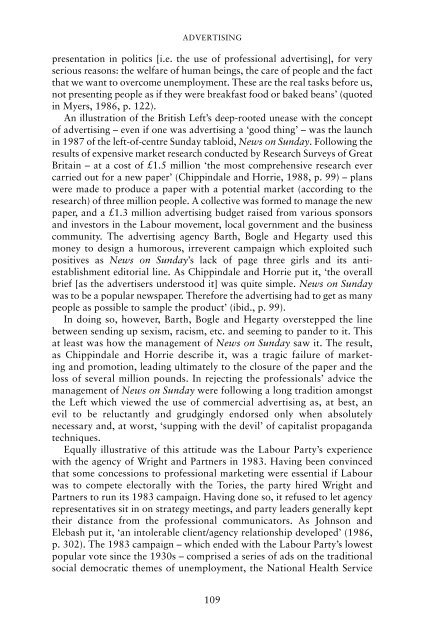20130412164339753295_book_an-introduction-to-political-communication
20130412164339753295_book_an-introduction-to-political-communication
20130412164339753295_book_an-introduction-to-political-communication
Create successful ePaper yourself
Turn your PDF publications into a flip-book with our unique Google optimized e-Paper software.
ADVERTISING<br />
presentation in politics [i.e. the use of professional advertising], for very<br />
serious reasons: the welfare of hum<strong>an</strong> beings, the care of people <strong>an</strong>d the fact<br />
that we w<strong>an</strong>t <strong>to</strong> overcome unemployment. These are the real tasks before us,<br />
not presenting people as if they were breakfast food or baked be<strong>an</strong>s’ (quoted<br />
in Myers, 1986, p. 122).<br />
An illustration of the British Left’s deep-rooted unease with the concept<br />
of advertising – even if one was advertising a ‘good thing’ – was the launch<br />
in 1987 of the left-of-centre Sunday tabloid, News on Sunday. Following the<br />
results of expensive market research conducted by Research Surveys of Great<br />
Britain – at a cost of £1.5 million ‘the most comprehensive research ever<br />
carried out for a new paper’ (Chippindale <strong>an</strong>d Horrie, 1988, p. 99) – pl<strong>an</strong>s<br />
were made <strong>to</strong> produce a paper with a potential market (according <strong>to</strong> the<br />
research) of three million people. A collective was formed <strong>to</strong> m<strong>an</strong>age the new<br />
paper, <strong>an</strong>d a £1.3 million advertising budget raised from various sponsors<br />
<strong>an</strong>d inves<strong>to</strong>rs in the Labour movement, local government <strong>an</strong>d the business<br />
community. The advertising agency Barth, Bogle <strong>an</strong>d Hegarty used this<br />
money <strong>to</strong> design a humorous, irreverent campaign which exploited such<br />
positives as News on Sunday’s lack of page three girls <strong>an</strong>d its <strong>an</strong>tiestablishment<br />
edi<strong>to</strong>rial line. As Chippindale <strong>an</strong>d Horrie put it, ‘the overall<br />
brief [as the advertisers unders<strong>to</strong>od it] was quite simple. News on Sunday<br />
was <strong>to</strong> be a popular newspaper. Therefore the advertising had <strong>to</strong> get as m<strong>an</strong>y<br />
people as possible <strong>to</strong> sample the product’ (ibid., p. 99).<br />
In doing so, however, Barth, Bogle <strong>an</strong>d Hegarty overstepped the line<br />
between sending up sexism, racism, etc. <strong>an</strong>d seeming <strong>to</strong> p<strong>an</strong>der <strong>to</strong> it. This<br />
at least was how the m<strong>an</strong>agement of News on Sunday saw it. The result,<br />
as Chippindale <strong>an</strong>d Horrie describe it, was a tragic failure of marketing<br />
<strong>an</strong>d promotion, leading ultimately <strong>to</strong> the closure of the paper <strong>an</strong>d the<br />
loss of several million pounds. In rejecting the professionals’ advice the<br />
m<strong>an</strong>agement of News on Sunday were following a long tradition amongst<br />
the Left which viewed the use of commercial advertising as, at best, <strong>an</strong><br />
evil <strong>to</strong> be reluct<strong>an</strong>tly <strong>an</strong>d grudgingly endorsed only when absolutely<br />
necessary <strong>an</strong>d, at worst, ‘supping with the devil’ of capitalist propag<strong>an</strong>da<br />
techniques.<br />
Equally illustrative of this attitude was the Labour Party’s experience<br />
with the agency of Wright <strong>an</strong>d Partners in 1983. Having been convinced<br />
that some concessions <strong>to</strong> professional marketing were essential if Labour<br />
was <strong>to</strong> compete elec<strong>to</strong>rally with the Tories, the party hired Wright <strong>an</strong>d<br />
Partners <strong>to</strong> run its 1983 campaign. Having done so, it refused <strong>to</strong> let agency<br />
representatives sit in on strategy meetings, <strong>an</strong>d party leaders generally kept<br />
their dist<strong>an</strong>ce from the professional communica<strong>to</strong>rs. As Johnson <strong>an</strong>d<br />
Elebash put it, ‘<strong>an</strong> in<strong>to</strong>lerable client/agency relationship developed’ (1986,<br />
p. 302). The 1983 campaign – which ended with the Labour Party’s lowest<br />
popular vote since the 1930s – comprised a series of ads on the traditional<br />
social democratic themes of unemployment, the National Health Service<br />
109
















